Related Research Articles
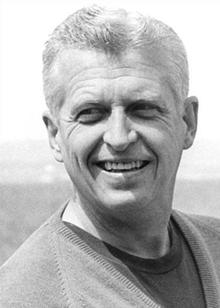
Philip Francis Berrigan was an American peace activist and Catholic priest with the Josephites. He engaged in nonviolent, civil disobedience in the cause of peace and nuclear disarmament and was often arrested.
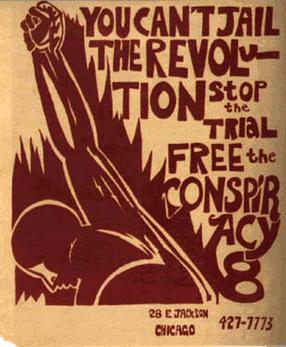
The Chicago Seven, originally the Chicago Eight and also known as the Conspiracy Eight or Conspiracy Seven, were seven defendants – Rennie Davis, David Dellinger, John Froines, Tom Hayden, Abbie Hoffman, Jerry Rubin, and Lee Weiner – charged by the United States Department of Justice with conspiracy, crossing state lines with intent to incite a riot, and other charges related to anti-Vietnam War and 1960s counterculture protests in Chicago, Illinois during the 1968 Democratic National Convention. The Chicago Eight became the Chicago Seven after the case against codefendant Bobby Seale was declared a mistrial.

Daniel Joseph Berrigan was an American Jesuit priest, anti-war activist, Christian pacifist, playwright, poet, and author.
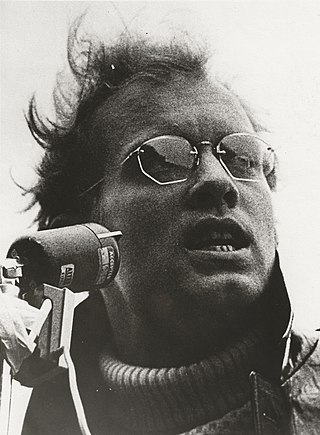
David Victor Harris was an American journalist and activist. After becoming an icon in the movement against the Vietnam War, organizing civil disobedience against military conscription and refusing his own orders to report for military duty, for which he was imprisoned for almost two years, Harris went on to a 50-year career as a distinguished journalist and author, reporting national and international stories.

The Chicano Moratorium, formally known as the National Chicano Moratorium Committee Against The Vietnam War, was a movement of Chicano anti-war activists that built a broad-based coalition of Mexican-American groups to organize opposition to the Vietnam War. Led by activists from local colleges and members of the Brown Berets, a group with roots in the high school student movement that staged walkouts in 1968, the coalition peaked with a August 29, 1970 march in East Los Angeles that drew 30,000 demonstrators. The march was described by scholar Lorena Oropeza as "one of the largest assemblages of Mexican Americans ever." It was the largest anti-war action taken by any single ethnic group in the USA. It was second in size only to the massive U.S. immigration reform protests of 2006.

Opposition to United States involvement in the Vietnam War began with demonstrations in 1965 against the escalating role of the United States in the Vietnam War. These demonstrations grew into a broad social movement over the ensuing several years. This movement informed and helped shape the vigorous and polarizing debate, primarily in the United States, during the second half of the 1960s and early 1970s on how to end the Vietnam War.
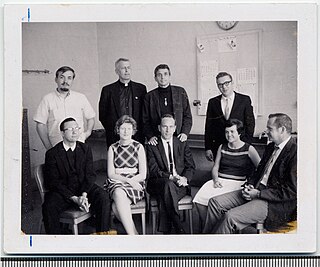
The Catonsville Nine were nine Catholic activists who burned draft files to protest the Vietnam War. On May 17, 1968, they took 378 draft files from the draft board office in Catonsville, Maryland, and burned them in the parking lot.
The Honeywell Project was a peace group based in Minneapolis, Minnesota, United States that existed from the late 1960s until around 1990. During its existence, the organization waged a campaign to convince the board and executives of the Honeywell Corporation to convert their weapons manufacturing business to peaceful production.
The Spring Mobilization Committee to End the War in Vietnam, which became the National Mobilization Committee to End the War in Vietnam, was a coalition of American antiwar activists formed in November 1966 to organize large demonstrations in opposition to the Vietnam War. The organization was informally known as "the Mobe".

The Camden 28 were a group of leftist, Catholic, anti-Vietnam War activists who in 1971 planned and executed a raid on a draft board in Camden, New Jersey, United States. The raid resulted in a high-profile criminal trial of the activists that was seen by many as a referendum on the Vietnam War and as an example of jury nullification.
Phoebe Elizabeth Hirsch is a former member of Students for a Democratic Society (SDS) and Weatherman (WUO).
James Peck was an American activist who practiced nonviolent resistance during World War II and in the Civil Rights Movement. He is the only person who participated in both the Journey of Reconciliation (1947) and the first Freedom Ride of 1961, and has been called a white civil rights hero. Peck advocated nonviolent civil disobedience throughout his life, and was arrested more than 60 times between the 1930s and 1980s.
Mitchell Goodman was an American writer, teacher, and activist. He is best known for his role in the Vietnam draft resistance movement, which drew the high-profile 1968 federal prosecution of the "Boston Five."
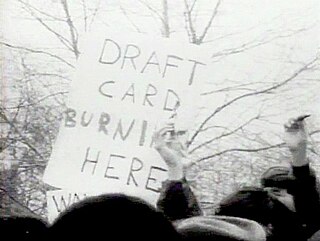
Draft-card burning was a symbol of protest performed by thousands of young men in the United States and Australia in the 1960s and early 1970s as part of the anti-war movement. The first draft-card burners were American men participating in the opposition to United States involvement in the Vietnam War. The first well-publicized protest was in December 1963, with a 22-year-old conscientious objector, Gene Keyes, setting fire to his card on Christmas Day in Champaign, Illinois. In May 1964, a larger demonstration, with about 50 people in Union Square, New York, was organized by the War Resisters League chaired by David McReynolds.

Gary Eugene Rader was an American Army Reservist known for burning his draft card in protest of the Vietnam War, while wearing his U.S. Army Special Forces uniform. Afterward, he engaged in anti-war activism.
Roger Henry Lippman is an American political activist. He was a member of the anti-Vietnam War groups Students for a Democratic Society (SDS) and the Seattle collective of Weatherman. He is most commonly noted as a member of the Seattle Seven, who was accused of, and tried for, conspiracy charges in 1970.
Andrew Dean Stapp was an American activist known for forming the American Servicemen's Union, an unofficial union for the U.S. military, in opposition to the Vietnam War.
The Milwaukee Fourteen were fourteen peace activists who burned Selective Service records to protest the Vietnam War. On 24 September 1968, they entered Milwaukee's Brumder Building, site of nine Wisconsin draft boards, gathered up about 10,000 files, carried them to an open public space, and set them on fire with homemade napalm. The fourteen then remained at the site, singing and reading from the gospels of John and Luke as Milwaukee firemen and police officers arrived. The subsequent trial of twelve of the protestors became the first resistance trial in which the defendants chose to represent themselves. After a trial of eleven days, the defendants were each found guilty of theft, arson, and burglary.
Ortez Alderson was an American AIDS, gay rights, and anti-war activist and actor. A member of LGBT community, he was a leader of the Black Caucus of the Chicago Gay Liberation Front, which later became the Third World Gay Revolution, and served a federal prison sentence for destroying files related to the draft for the Vietnam War. In 1987, he was one of the founding members of ACT UP in New York City, and helped to establish its Majority Action Committee representing people of color with HIV and AIDS. Regarded as a "radical elder" within ACT UP, he was involved in organizing numerous demonstrations in the fight for access to healthcare and treatments for people with AIDS, and participated in the group's meetings with NYC Health Commissioner Stephen Joseph as well as the FDA. In 1989, he moved back to Chicago and helped to organize the People of Color and AIDS Conference the following year. He died of complications from AIDS in 1990, and was inducted posthumously into the Chicago LGBT Hall of Fame.
References
- ↑ Potts, Derek (8 May 2019). "Commemorating the 50th Anniversary of the Chicago 15 Peace Action". news.library.depaul.press.
- 1 2 Times, Seth S. King Special to The New York (May 17, 1970). "Trial of Draft Board Ransackers to Hear a Challenge to War". The New York Times– via NYTimes.com.
- ↑ "Draft Record Trial, set". The New York Times. February 25, 1970 – via NYTimes.com.
- ↑ Modern Society. Loyola University. 1969.
- ↑ Catholic World. Paulist Fathers. 1970.
- ↑ Harris, Liz (June 2, 2020). "'Failure to Appear': At 73, Vietnam-era anti-war fugitive tells her story".
- ↑ Win Peace and Freedom Thru Nonviolent Action. WIN Publishing Empire. 1973.
- ↑ "Lives they Lived: 'He put his life on the line for what he believed in'". AP NEWS. 14 June 2018.
- 1 2 "National Catholic Reporter 8 May 1970 — Catholic Research Resources Alliance". thecatholicnewsarchive.org.
- ↑ "10 FOES OF DRAFT GUILTY IN CHICAGO". The New York Times. 1970-06-06.
- ↑ "Peacemaking: Images from Resistance Actions 1967-73". www.jonahhouse.org.